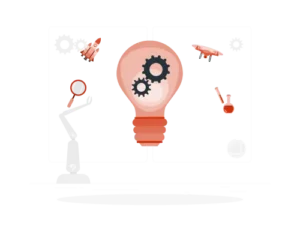The insurance industry is constantly evolving, and staying ahead of the competition requires businesses to adopt innovative solutions that can help them streamline their operations, reduce costs, and enhance their customer experience. One such solution that has become increasingly popular in recent years is robotic process automation in insurance.
Managing and processing the immeasurable amount of data in the insurance industry is remarkable. A vast number of repetitive activities are executed by millions of employees every day to process these data.
The insurance industry embodies a profusion of heuristic processes, such as claim processing, underwriting, servicing policies, customer support, and many others. Such activities do not require an employee to think but to follow a predefined set of criteria.
Employees complete one activity after another in a robotic fashion without giving much thought to what they are doing. These are mind-numbing activities for the employees. There is no creativity, no self-development opportunity, and no job satisfaction. However, if you see it from the perspective of automation, all these repetitive processes could be automated and save costs incurred by companies on employees’ salaries and benefits.
Benefits of RPA in Insurance
The adoption of RPA in insurance offers numerous benefits, including:
- Higher Revenue: Robotic Process Automation in insurance companies can help to metamorphose their operational activities and gear up for more revenue.
- Excellent Employee Experience: It has the potential to free employees to look for opportunities where they can grow themselves. Robotic process automation in insurance companies helps them modernize their processing ways and makes the company more responsive to the changing business environment.
- Cost Saving: By deploying RPA in the insurance company, the company moves towards a cost-saving production. Robotic Process Automation helps to streamline the business processing of insurance companies.
- 100% Accuracy: Elimination of human errors and high data accuracy is also possible with robotic process automation in the insurance industry. As RPA is immersed in insurance companies, the accuracy level increase by 95%.
- High-Speed Processing: RPA can transit across various systems. This transition helps to automate data transfer. After getting the data transfer process automated, RPA speeds up other data-related processes such as new customer registration, policy cancellation, and more.
- Unity between humans and robots: Robotic Process Automation (RPA) makes companies agile concerning handling changes and adopting something new. They do not have to convince thousands of employees to accept the change. A few adjustments in existing RPA processes will be enough to embrace the change. RPA takes the robotic functioning out of humans and allows humans to put up their creative and strategic skillsets to work. It will enable humans to work with robots in solidarity.
6 Important Use Cases of RPA in Insurance
The insurance industry possesses a vast number of opportunities for robotic process automation to streamline business processing. There are several processes in insurance companies where automation can be materialized.
But there are some important use cases where the implementation of RPA is elementary.
Below is a list of 6 important use cases of RPA in insurance.
Claims Processing
Claim processing is highly a labor-intensive process that requires a person to handle a lot of paper works. Toggling between piles of paper and performing manual data entry is time-consuming.
RPA can streamline the claims processing by automating the collection and processing of claims data. Bots can extract data from various sources, such as emails, forms, and attachments, and enter them into the appropriate systems. RPA in insurance expedites the entire claiming process.
Fraud detection
Fraud in the insurance industry is quite common such as false claims, inflated claims, disaster fraud, faked death, and more.
When employees assess the applications manually, there are possibilities of making mistakes. Employees can misconstrue details provided by the customers and approve the wrong claim. It often occurs due to the inability of the employees to accurately validate extensive customer data every time with similar efficiency and reach a correct conclusion.
RPA in insurance, on the other hand, can thoroughly analyze past data, detect anomalies, and generate alerts for human employees for further assessment every time with the same efficiency.
Underwriting and pricing
Through underwriting services, insurance companies accept the financial risk occurring from losses or damages and pay equivalent amounts to the customers.
With robotic process automation in insurance companies, it can assess the risk level of clientele and determine the price it should charge to insure the risk. RPA can do a detailed risk assessment by collating and analyzing data from appropriate internal and external sources.
Working with legacy systems
When it comes to staying relevant with the fast-paced business environment, companies need to upgrade their infrastructure now and then. It adds cost to operating the business and temporarily slows down the processes. However, with RPA in insurance companies, they do not have to replace their legacy applications. The versatility of RPA allows it to work with new and old systems comfortably.
Customer Service
Robotic Process Automation (RPA), allying with artificial intelligence or machine learning, can handle customer queries 24 x 7. It can also assess customer data regularly and notify customers to renew their policies on time. It can prevent customers from losing their insurance, thus increasing customer lifetime value.
Regulatory compliance
Insurance companies have to comply with various rules and regulations as defined by state and national policies. However, the standards change with time, and it requires that the employees and the customers readily adopt the change. But it rarely happens.
RPA can help cope with such change. It can make it easier to stick to the new regulations. Also, building audit trails in RPA is more facile; it significantly reduces the risks related to regulatory breaches.
Apart from these six areas, various other processes handled by Robotic Process Automation in the insurance industry include renewals, reporting, surrender, endorsement, proposal generation, premium suspense, insurance quote generation, life insurance maturity claim, and more. RPA can successfully get implemented in all these areas. It can lower cost, run with efficiency and accuracy, and grow in size together with the business.
TL;DR
- Robotic process automation (RPA) in insurance can streamline operations, reduce costs, and enhance customer experience
- Insurance involves many repetitive tasks that can be automated, freeing up employees to focus on growth opportunities
- RPA adoption offers benefits such as higher revenue, cost savings, 100% accuracy, high-speed processing, and unity between humans and robots
- Important use cases of RPA in insurance include claims processing, fraud detection, underwriting and pricing, working with legacy systems, customer service, and regulatory compliance.
Take the first step towards adopting RPA
RPATech specializes in harnessing the power of Robotic Process Automation (RPA) and Artificial Intelligence (AI) to help businesses streamline their operations. Our track record of successful automation and 20% quicker implementation and identifying areas for cost reduction and time savings is a testament to our expertise. If you’re looking to step into the future and enhance your insurance solutions, we encourage you to consider leveraging RPA. To learn more and schedule an appointment with our team, write to us at hello@rpatech.ai or call us at (+91) 8010-369-369.




